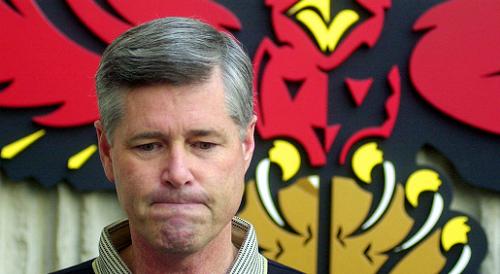
De-constructing a franchise: The story of Pete Babcock
Pete Babcock’s legacy with the Atlanta Hawks and the NBA is unforgettable.
Life as a general manager in the NBA is difficult to say the least. Any job that relies on performers can be tumultuous, and injuries can often render a once promising season a failure. It is an often thankless position, where pleasing everyone may be the least realistic goal of all.
That being said, there are ways to avoid displeasing everyone. Babcock never took notice of the latter.
During his 13 year tenure as GM of the Hawks, Babcock saw his teams progress to the post-season an impressive eight times, but he will always be remembered for questionable draft selections and trades that haunted the franchise for years to come.
The first and least forgettable of his miscues could be described by Hawks fans as no less than a treasonous act. On February 24, 1994, Babcock traded team icon and fan favourite Dominique Wilkins and a conditional first round draft pick (1994 no. 25 overall, Greg Minor) to the Los Angeles Clippers in exchange for Danny Manning.
The “Human Highlight Film” had been averaging 24.4 points, 6.2 rebounds and 2.3 assists to start the season, while leading the Hawks to a 36-16 record.
He was selected to his eighth All-Star game that season, and left Atlanta as the franchise’s all-time leading scorer with over 23,000 points.
[php snippet=1]
Manning, who became a free agent to conclude the season opted against re-signing with the team. In response, Babcock released a statement saying that, “In-house, we asked ourselves the question, ‘Would we do this if we knew Danny would not be back?’ It was unanimous on our staff that it was worth making the deal.”
The Atlanta faithful disagreed.
Including Georgia native Garrick Respress, who was said, “In my life nothing has affected me as much as the distasteful move made by the Hawks and Pete Babcock in trading Dominique Wilkins.”
In his 2001 story, CNNSI’s Kevin Laughery explained that, “fans still haven’t forgiven management.”
During ‘Nique’s jersey retirement ceremony on January 13, 2001 Hawks President Stan Kasten referred to Wilkins as, “the very symbol of our franchise and our time here in Atlanta”. His fifteen minute speech was presented amidst a solid rain of boos, in which he took the brunt for Babcock’s blunder.
Following the Wilkins trade, Babcock made questionable draft selections for years to come. Most notable were his first round selections of Ed Gray and Roshown McLeod.
Gray was taken with the 22nd overall pick in 1997, and went on to spend only two years in the association, both were marked by injury, inconsistency and off-court troubles.
McLeod was selected twentieth overall the following season, and remained in the NBA for only three anti-climatic seasons.
Despite misuse of his picks, Babcock was able to rebound and construct an Atlanta squad that finished the 1998-99 campaign with the fourth best record in the Eastern Conference.
That off-season however, he saw fit to make another trade. This time he shipped productive marksman Steve Smith to the Portland Trailblazers in exchange for Isaiah Rider and Jimmy Jackson.
Rider’s time in Atlanta was marked by controversy. He frequently took liberties such as missing practice, having run-ins with the police and even parking in the reserved space at Phillips Arena belonging to Thrashers Head Coach Curt Fraser. When accused of smoking marijuana in his hotel room the league demanded that he attend drug counselling, his refusal to comply resulted in fines totalling $200,000 until he finally agreed to attend.
The final straw came in March, when Rider showed up late to a game against the Pistons. Rather than serve a three-game suspension, he sought to be dismissed from his contract with the team.
Babcock obliged.
Page 2’s Bomani Jones explained the error in Babcock’s decision making by drawing comparisons with the ever popular Parker Brother’s board game Monopoly.
“Instead of transforming the Hawk’s from a ho-hum playoff qualifier to a major player in the East,” said Bomani. “Acquiring Rider sent them straight to jail. No passing Go. No $200.”
The Hawks wouldn’t return to the playoffs for nine years.
Following his dismissal from Atlanta in 2003, Babcock went on to join his brother Rob in Toronto from 2004-2006. As director of player personnel, he contributed to the brain trust that traded Vince Carter to the Nets for a disgruntled Alonzo Mourning (whom the team bought out at full asking price), unspectacular role players Erick and Aaron Williams, and two first round draft choices, the best of which went on to be Joey Graham.
The brothers Babcock also elected to draft Brazilian big man Rafael Araujo out of Bringham Young University with the eighth overall pick in the 2004 NBA Draft ahead of the likes of Josh Smith, Andre Iguodala, and Al Jefferson.
The Maple Leafs Sports and Entertainment brass saw fit to relieve both of their duties with the Raptors just more than a year after being hired.
Few GM’s are able to truly leave their stamp on an organization for the foreseeable future. Pete Babcock achieved this goal. His notoriety will live on with disgruntled Hawks fans for decades to come.
[php snippet=1]

